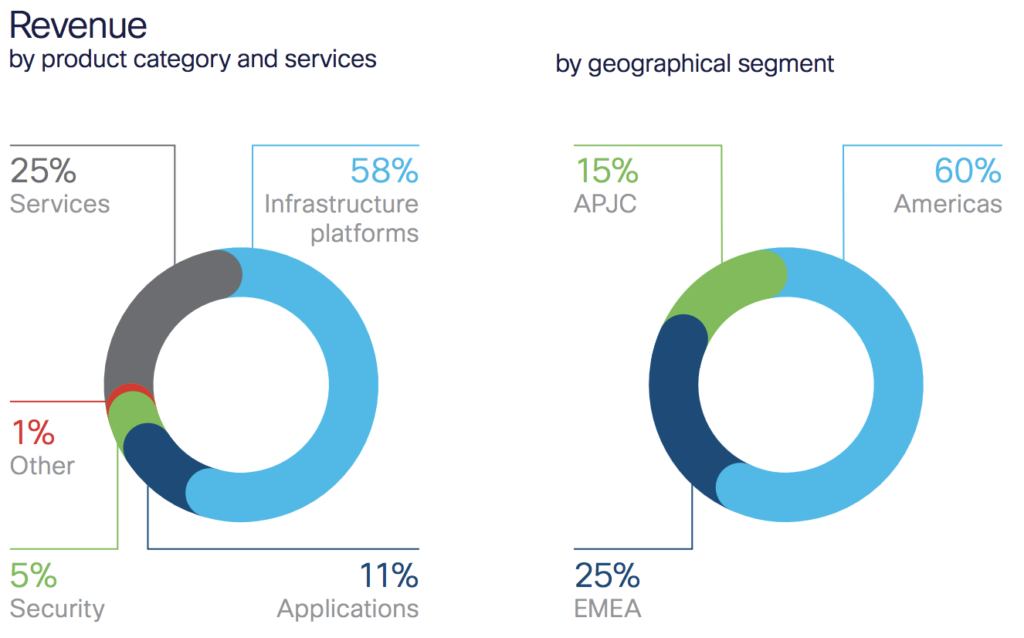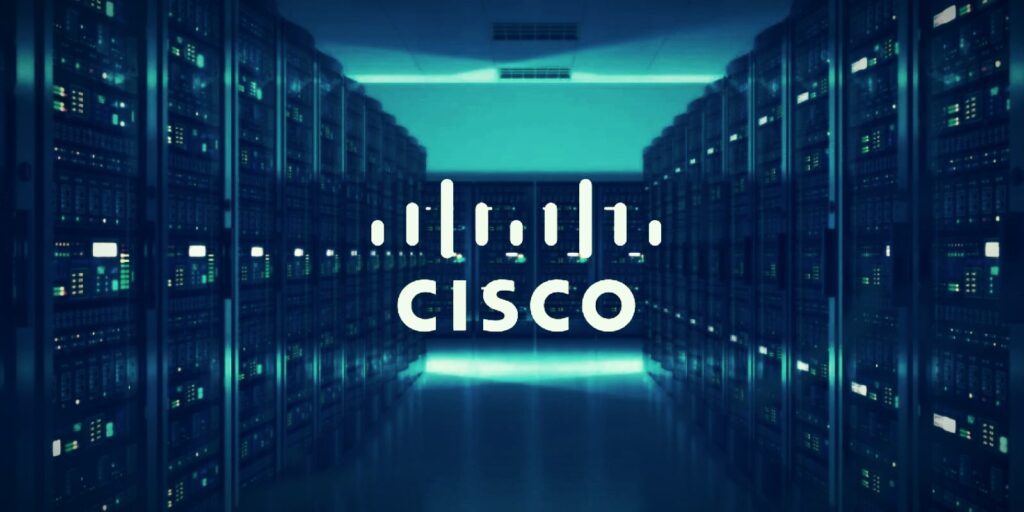Cisco Systems, Inc., commonly known as Cisco, is a global leader in networking technology and solutions. Founded in December 1984 by Leonard Bosack and Sandy Lerner, two computer scientists from Stanford University, Cisco has grown from a small startup into a multinational corporation that plays a pivotal role in the way people connect and communicate. Headquartered in San Jose, California, Cisco is at the forefront of developing innovative networking hardware, telecommunications equipment, and high-tech products and services.
Cisco’s primary business segments include Infrastructure Platforms, Applications, Security, and Services. Each of these segments is integral to Cisco’s comprehensive portfolio of solutions designed to address the diverse needs of its customers, ranging from small businesses to large enterprises and service providers.

Infrastructure Platforms: This segment includes Cisco’s core networking products such as routers, switches, and wireless solutions. These products are essential for building and maintaining robust and efficient network infrastructures, enabling seamless communication and data transfer across various environments. Cisco’s innovations in this area have set industry standards, ensuring high performance, reliability, and scalability.
Applications: Cisco provides a range of applications that enhance collaboration and productivity. Key products include Cisco Webex, a leading video conferencing and collaboration platform, and Cisco Meraki, a cloud-managed IT solution. These applications are designed to facilitate remote work, enhance team collaboration, and improve operational efficiency for businesses of all sizes.
Security: In an era where cybersecurity threats are increasingly sophisticated, Cisco’s security solutions play a critical role in protecting digital assets. The company’s security portfolio includes next-generation firewalls, intrusion prevention systems, and advanced threat protection solutions. Cisco’s commitment to cybersecurity ensures that its customers can operate in a secure and protected environment.
Services: Cisco offers a wide range of services to support its products and solutions. These services include technical support, advanced services, and advisory services that help customers optimize their network performance, reduce risks, and achieve their business objectives. Cisco’s services are designed to provide comprehensive support throughout the entire lifecycle of its products.
Cisco’s influence extends beyond its products and services to its role as a thought leader in the technology industry. The company is known for its strong commitment to research and development, investing billions of dollars annually to drive innovation and stay ahead of technological trends. This dedication to R&D has resulted in numerous breakthroughs and patents, solidifying Cisco’s position as a pioneer in networking technology.
Corporate social responsibility (CSR) is also a significant aspect of Cisco’s operations. The company is committed to sustainability, ethical business practices, and giving back to the community. Cisco’s CSR initiatives include efforts to reduce its environmental footprint, promote diversity and inclusion, and support education and economic development programs around the world.
Cisco’s vision for the future is centered on the concept of the “Internet of Everything” (IoE), which envisions a world where people, processes, data, and things are all interconnected through a seamless network. This vision drives Cisco’s strategic initiatives and product development efforts, aiming to create a smarter, more connected world.
In conclusion, Cisco Systems, Inc. has established itself as a cornerstone of the technology industry, with a rich history of innovation, a comprehensive range of products and services, and a forward-looking vision. Its impact on networking and communication technology is profound, and its ongoing commitment to excellence ensures that Cisco will continue to be a leader in the industry for years to come.
Exploring Cisco’s Top Competitors and Alternatives
Cisco Systems is a global leader in networking and telecommunications equipment, known for its routers, switches, cybersecurity solutions, and software for managing data centers and cloud operations. However, it faces stiff competition from a variety of firms, each bringing unique strengths and challenges to the table. Here’s an analysis of Cisco’s top eight competitors and alternatives:
1. Juniper Networks
Website – https://www.juniper.net/
Juniper Networks is a major competitor in the routing and switching market, directly challenging Cisco’s core business areas. Juniper offers high-performance network solutions that are widely respected in the telecommunications sector for their efficiency and reliability. Juniper’s products are particularly favored by service providers and large enterprises for their advanced networking capabilities that support data-intensive applications, a space where Cisco also operates but with a broader product portfolio.
In terms of innovation, Juniper Networks often emphasizes simplicity and programmability in its products, appealing to customers looking for flexible and scalable networking solutions. This contrasts with Cisco’s approach, which includes a comprehensive suite of features and extensive integration with its other technology offerings like security and software-defined networking. Juniper’s focus on streamlined and scalable solutions presents a compelling option for customers prioritizing ease of use and high performance.
2. Huawei
Website – https://www.huawei.com/en/
Huawei is one of Cisco’s largest global competitors, offering a comparable range of networking equipment, including routers, switches, and IT infrastructure products. Based in China, Huawei has a strong presence in Asia and Europe, and its competitive pricing makes it a popular choice in emerging markets, directly competing with Cisco’s international business operations.
However, political challenges, particularly from the United States and other Western countries, have impacted Huawei’s business. These challenges center around security concerns and trade restrictions, which have somewhat leveled the playing field for Cisco in markets wary of Huawei’s products. Despite this, Huawei’s continued innovation and aggressive market penetration in regions without restrictions keep it a strong competitor against Cisco.
3. Arista Networks
Website – https://www.arista.com/en/
Arista Networks specializes in high-performance data center and cloud networking solutions, areas where Cisco is also heavily invested. Arista’s products are known for their scalability and efficiency, making them ideal for data-intensive environments like large data centers and computing clouds. This focus makes Arista a significant competitor to Cisco in the cloud networking market.
Arista’s commitment to software-driven solutions offers a distinct competitive edge, often appealing to tech-savvy enterprises and cloud service providers looking for flexible and programmable networking options. This contrasts with Cisco’s more traditional hardware-centric approach, although Cisco has been shifting towards more integrated software solutions to maintain competitiveness.
4. Hewlett Packard Enterprise (HPE)
Website – https://www.hpe.com/us/en/
Hewlett Packard Enterprise offers a broad range of IT infrastructure products and services that compete with Cisco’s product lines, particularly in servers, storage, and networking gear. HPE has been focusing on hybrid IT solutions and services that integrate both on-premises and cloud resources, competing with Cisco’s initiatives in similar areas.
HPE differentiates itself with a strong emphasis on hybrid IT and edge computing solutions, catering to enterprises looking to distribute their computing resources effectively. This focus challenges Cisco’s dominance in networking and data center products by offering an integrated approach to IT infrastructure that is adaptive to modern enterprise needs.
5. Palo Alto Networks
Website – https://www.paloaltonetworks.com
Palo Alto Networks is a leader in cybersecurity solutions, directly competing with Cisco in the security sector. Palo Alto provides advanced firewalls and cloud-based security solutions that are highly regarded for their effectiveness and innovation, areas where Cisco also offers robust products but with a different approach.
Palo Alto’s focus on security as its core business gives it an edge in innovation and specialization over Cisco, which has a broader technology focus. This specialization allows Palo Alto to quickly adapt to new cybersecurity threats and challenges, pushing Cisco to continually innovate and expand its security offerings to remain competitive.
6. Dell Technologies
Website – https://www.dell.com/
Dell Technologies competes with Cisco in multiple areas, including servers, storage, and networking equipment. Dell’s acquisition of EMC has significantly strengthened its position in data storage and management, directly challenging Cisco’s storage solutions. Dell’s extensive product portfolio provides integrated solutions across computing, networking, and storage, which appeals to businesses looking for comprehensive IT infrastructure.
Additionally, Dell’s strong brand recognition and established customer base in the PC market provide cross-selling opportunities for its network products, a strategy that Cisco counters with its own end-to-end product ecosystem. Dell’s ability to offer bundled IT solutions presents a significant challenge to Cisco, especially in competing for enterprise-level contracts.
7. Fortinet
Website – https://www.fortinet.com/
Fortinet is another key player in the cybersecurity space, offering a range of products that include firewalls, anti-virus, intrusion prevention, and endpoint security solutions. These products compete directly with Cisco’s security offerings. Fortinet is known for its integrated security platform, the Security Fabric, which offers broad protection across an organization’s entire digital footprint.
Unlike Cisco, which integrates security features into a broader range of IT products, Fortinet focuses exclusively on security solutions, providing them with deep expertise and a comprehensive approach to security. This focus makes Fortinet a preferred provider for many organizations looking for dedicated security solutions, pushing Cisco to enhance its own security products and services continually.
8. F5 Networks
Website – https://www.f5.com/
F5 Networks specializes in application delivery networking and network security, providing products that optimize the delivery of network-based applications and the security, performance, and availability of servers, data storage devices, and other network resources. F5’s tailored solutions in application delivery and its advanced security features make it a strong competitor to Cisco’s similar offerings.
F5’s approach to managing application traffic and performance is highly specialized, offering customization options that appeal to businesses with specific needs around application performance. This level of specialization contrasts with Cisco’s broader approach, where application delivery is integrated into a larger suite of networking products. F5’s dedicated focus allows it to innovate in ways that can challenge Cisco’s one-size-fits-all solutions, particularly in environments where performance and customization are critical.
These competitors each bring distinct strengths and strategies to the table, challenging Cisco across various fronts from core networking and cloud data management to cybersecurity and application delivery. Cisco’s ongoing success depends on its ability to innovate, adapt to emerging technologies, and maintain its leadership in customer service and product integration.
Also Read: Marketing Strategy and Marketing Mix of Cisco
To read more content like this, subscribe to our newsletter
Go to the full page to view and submit the form.

